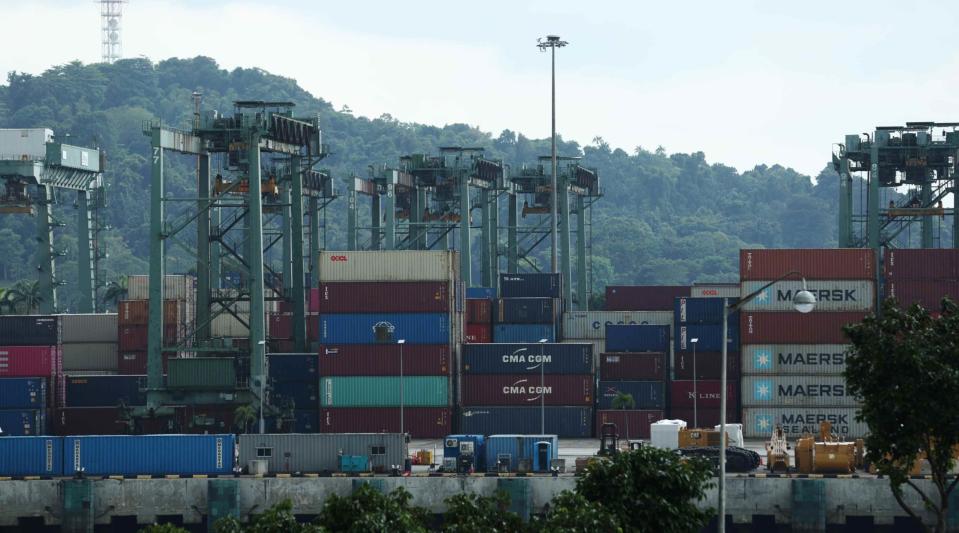MPA signs agreements to explore maritime digitalisation and decarbonisation

In addition, four organisations presented their initial findings on the feasibility of ammonia at the April 27 conference.
The Maritime and Port Authority of Singapore (MPA) has signed a memorandum of understanding (MOU) with Finnish technology group Wärtsilä to collaborate on exploring alternative fuels, optimise digital port operations and develop future talent.
MPA also signed letters of intent (LOI) with eight classification societies to collaborate on maritime digitalisation and decarbonisation.
Both signings were witnessed at the Accelerating Decarbonisation Conference on April 27, as part of Singapore Maritime Week.
Memorandum of understanding
Under the MOU, MPA and Wärtsilä will explore renewable fuel technologies and seek partnerships with various stakeholders to develop green fuel safety concepts and procedures to ensure safe handling and adoption of future fuels.
MPA and Wärtsilä will also collaborate on assessing cyber threats and risks to shipboard systems, ship-shore system communications and MPA’s digital platforms. The two parties will seek to make port operations more efficient through developing reliable, secure and cost-effective data exchanges between vessels and port operations.
To equip future maritime workforce with skills and competencies relating to digitalisation and decarbonisation, the collaboration could include working with the Tripartite Advisory Panel under the Alliance for Future Maritime Talent to co-create enhanced training curricula.
Kenneth Lim, MPA’s assistant chief executive of industry and transformation, says: “As a major bunkering and a maritime hub port supported by a robust R&D and start-up ecosystem, Singapore is at the heart of marinetech innovation and at an exciting phase for the potential introduction of maritime fuels such as methanol, hydrogen and its derivatives such as ammonia.”
Letter of intent
Under the LOI, MPA and the eight classification societies will strive to collaborate in areas such as smart and autonomous shipping, cyber security, electrification and zero- and low-carbon fuels. “This will help advance the development of new technologies and solutions, and benefit the global maritime community,” says MPA in an April 27 press release.
The eight classification societies are authorised by MPA as recognised organisations to conduct statutory certification, survey, inspection and audit services for Singapore-registered ships.
The eight societies are: the American Bureau of Shipping, Bureau Veritas Marine & Offshore, China Classification Society, DNV, Korean Register, Lloyd’s Register of Shipping, Nippon Kaiji Kyokai (ClassNK) and RINA Services S.p.A.
Teo Eng Dih, chief executive of MPA, says: “With the rapid changes brought about by decarbonisation and digitalisation, there is a need for collaboration to learn from one another, partner like-minded stakeholders to build capabilities, and accelerate the development and adoption of new technologies. This LOI will pave the way for MPA to work with these eight recognised classification societies to shape standards, and contribute to develop innovative, viable and cost-effective measures with our trading partners, green and digital shipping corridor partners and the global maritime community.”
Ammonia studies
MPA and the Energy Market Authority have called for an expression of interest (EOI) for ammonia power generation and bunkering, which will close by April 30.
Four research institutes and companies presented their initial findings on the safety and feasibility of ammonia as a marine fuel at the April 27 conference.
Vopak Terminals Singapore’s managing director Rob Boudestijin spoke about his company’s study on enabling safe ammonia supply chains.
Liu Ming, research lead at the Maritime Energy & Sustainable Development Centre of Excellence, outlined the consequences from accidental ammonia leaks and mitigation measures.
Nguyen Vinh Tan from the Institute of High Performance Computing at A*STAR spoke about a risk assessment framework for accidental ammonia leaks and how they will evolve in the future.
Finally, Prof Lynn Loo, CEO of the Global Centre for Maritime Decarbonisation (GCMD) presented findings from an ammonia safety study by its appointed consultant DNV Maritime Advisory (DNV) supported by Surbana Jurong and the Singapore Maritime Academy at the Singapore Polytechnic.
MPA will work with shortlisted consortia and companies from the EOI to conduct further studies, tabletop exercises and training programmes, “as part of a rigorous set of evaluation prior to the conduct of any ammonia-related trials in Singapore”.
MPA was established in February 1996 to develop Singapore as a premier global hub port and international maritime centre, and to advance and safeguard Singapore’s strategic maritime interests.
MPA takes on the roles of port authority, maritime and port regulator and planner, international maritime centre champion and national maritime representative.
In 2022, Singapore remained one of the world’s busiest transshipment hubs with a container throughput of 37.3 million 20-foot equivalent units (TEUs).
See Also:
Click here to stay updated with the Latest Business & Investment News in Singapore
'Low or mitigable' risk in ammonia bunkering in Singapore’s waters: GCMD, DNV study
EMA grants Keppel Energy conditional approval for Cambodia renewable energy import project
Sembcorp successfully commissions Southeast Asia’s largest energy storage system
Get in-depth insights from our expert contributors, and dive into financial and economic trends

 Yahoo Finance
Yahoo Finance 